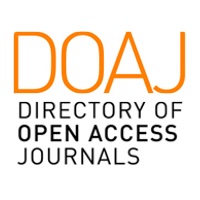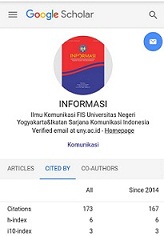Diffusion of artificial intelligence-based learning innovation: A case study in MTs Muhammadiyah Tawangsari Sukoharjo
DOI:
https://doi.org/10.21831/informasi.v53i2.71865Abstract
Madrasah Tsanawiyah Muhammadiyah Tawangsari is a junior high school level educational institution that bases its curriculum on Islamic principles and progressively applies information technology (IT) on the foundation of Muhammadiyah values. This study aims to determine the process of diffusion of innovation in technology-based learning, focusing on the role of teachers as agents of change in applying artificial intelligence in the context of learning. The research method used was qualitative descriptive, involving in-depth interviews with four teachers who had key roles in introducing the innovation. The results showed that most teachers have received information about the use of artificial intelligence through various socialization activities, workshops, and training. The diffusion of learning innovations in MTs Tawangsari involves various communication channels, including interpersonal communication such as lectures, dialogues, and demonstrations of effective practices; communication through mass media, such as the publication of writings on school websites; and communication through social media, such as Youtube, Instagram, and Facebook. In addition, teachers consider that innovation in post-pandemic learning has significant urgency, with success indicators in the form of increased active student participation in the learning process. In addition, teachers also voiced the need for community platforms and continuous training on artificial intelligence-based learning.References
Agustini, P. (2023, November 10). Secretary General of Communication and Information: The use of AI must be in accordance with ethical values in Indonesia. Aptika. https://aptika.kominfo.go.id/2023/11/sekjen-kominfo-penggunaan-ai-harus-sesuai-dengan-nilai-etika-di-indonesia/
Burger, B., Kanbach, D. K., Kraus, S., Breier, M., & Corvello, V. (2023). On the use of AI-based tools like ChatGPT to support management research. Emerald. https://doi.org/10.1108/ejim-02-2023-0156
Duffy, T., & Jonassen, D. (1992). Constructivism and the technology of instruction a conversation. Routledge.
Dwivedi, Y. K., Kshetri, N., Hughes, L., Slade, E. L., Jeyaraj, A., Kar, A. K., ... Wright, R. (2023). Opinion paper: "so what if ChatGPT wrote it?" multidisciplinary perspectives on opportunities, challenges and implications of generative conversational AI for research, practice and policy. Elsevier BV. https://doi.org/10.1016/j.ijinfomgt.2023.102642
Ertmer, P. A., & Ottenbreit-Leftwich, A. T. (2010). Teacher technology change. Informa UK Limited. https://doi.org/10.1080/15391523.2010.10782551
Fuchs, K. (2023). Exploring the opportunities and challenges of NLP models in higher education: is Chat GPT a blessing or a curse? Frontiers Media SA. https://doi.org/10.3389/feduc.2023.1166682
Fullan, M. (2015). The new meaning of educational change 5th edition. Teachers College Press.
Goralski, M. A., & Tan, T. K. (2020). Artificial intelligence and sustainable development. International Journal of Management Education, 18(1). https://doi.org/10.1016/j.ijme.2019.100330
Indonesia. Department of Communication and Information. (2019). Minister of communication and information encourages the use of artificial intelligence for government services. https://aptika.kominfo.go.id/2019/09/menkominfo-dorong-pemanfaatan-kecerdasan-buatan-untuk-layanan-pemerintah
Indonesia. Department of Education and Culture. (2020). Guidelines for learning from home during disaster emergencies. https://bersamahadapikorona.kemdikbud.go.id/pedoman-pelaksanaan-belajar-dari-rumah-selama-darurat-bencana-covid-19-di-indonesia/
Koh, E., & Doroudi, S. (2023). Learning, teaching, and assessment with generative artificial intelligence: towards a plateau of productivity. Informa UK Limited. https://doi.org/10.1080/23735082.2023.2264086
Kumar, S., Rao, P., Singhania, S., Verma, S., & Kheterpal, M. (2024). Will artificial intelligence drive the advancements in higher education? a tri-phased exploration. Elsevier BV. https://doi.org/10.1016/j.techfore.2024.123258
Lakshmi, A. J., Kumar, A., Kumar, M. S., Patel, S. I., Naik, S. K. L., & Ramesh, J. V. N. (2023). Artificial intelligence in steering the digital transformation of collaborative technical education. Elsevier BV. https://doi.org/10.1016/j.hitech.2023.100467
Littlejohn, Stephen W., Karen A. Foss, & John G. Oetzel. (2017). Theories of human communication (11th ed.). Waveland Press Inc.
Ma, S., & Lei, L. (2024). The factors influencing teacher education students' willingness to adopt artificial intelligence technology for information-based teaching. Informa UK Limited. https://doi.org/10.1080/02188791.2024.2305155
Nasution, H. (2012). Implementation of fuzzy logic in artificial intelligence systems. ELKHA Journal, 4(2), 4–8. https://doi.org/10.26418/elkha.v4i2.512
Rusmiarti, D,A. (2015). Analysis of diffusion of innovation and development of work culture in bureaucratic organizations. Journal of the Telematics and Information Society, 6(2), 85-100.
Sousa, W. G. de, Melo, E. R. P. de, Bermejo, P. H. D. S., Farias, R. A. S., & Gomes, A. O. (2019). How and where is artificial intelligence in the public sector going? A literature review and research agenda. Government Information Quarterly, 36(4), 101392. https://doi.org/10.1016/j.giq.2019.07.004
Sofianto, A., & Zuhri, M. (2021). Barriers and solutions for sistance learning in the covid-19 pandemic era in central java. Journal of Education and Culture, 6(2), 173 - 186. https://doi.org/10.24832/jpnk.v6i2.1841
Subandi, T. (2011). Educational innovation. Muhammadiyah University Press
Tam, G. & El-Azar, D. (2020, Maret 13). 3 ways the coronavirus pandemic could reshape education. We Forum. https://www.weforum.org/agenda/2020/03/3-ways-coronavirus-is-reshaping-education-and-what-changes-might-be-here-to-stay/
Wahono, R.S. (2023, September 23). AI technology and corruption eradication. Anti-Corruption Education Center. https://aclc.kpk.go.id/aksi-informasi/Persepsi/20230929-teknologi-ai-dan-pemberantasan-korupsi
Wahyudi, M.Y, & Hidayat, A. (2023). Implementation of artificial intelligence (AI) in the field of vocational education in the era of the industrial revolution 4.0. Faculty of Engineering, Makassar State University. https://doi.org/10.59562/semnasdies.v1i1.794
Xu, Y., Liu, X., Cao, X., Huang, C., Liu, E., Qian, S., ... Zhang, J. (2021). Artificial intelligence: A powerful paradigm for scientific research. Elsevier BV. https://doi.org/10.1016/j.xinn.2021.100179
Downloads
Published
Issue
Section
License
Authors who publish with this journal agree to the following terms:- Authors retain copyright and grant the journal right of first publication with the work simultaneously licensed under a Creative Commons Attribution License that allows others to share the work with an acknowledgement of the work's authorship and initial publication in this journal.
- Authors are able to enter into separate, additional contractual arrangements for the non-exclusive distribution of the journal's published version of the work (e.g., post it to an institutional repository or publish it in a book), with an acknowledgement of its initial publication in this journal.
- Authors are permitted and encouraged to post their work online (e.g., in institutional repositories or on their website) prior to and during the submission process, as it can lead to productive exchanges, as well as earlier and greater citation of published work (See The Effect of Open Access).




















